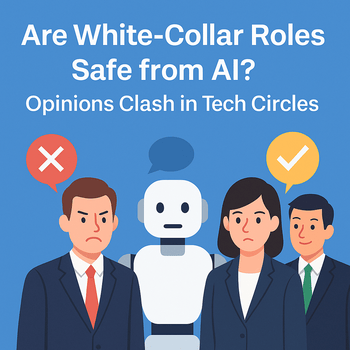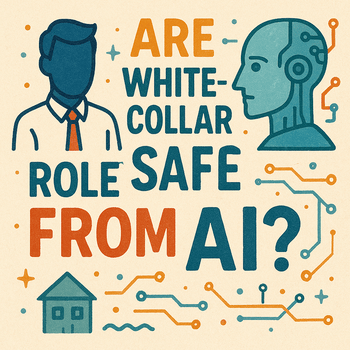Exploring the Future of Office Jobs in the Age of Artificial Intelligence
Generative AI has rapidly evolved from novelty to necessity. Today, professionals use it to write emails, analyze data, manage calendars, code, and generate reports—tasks once reserved for humans. Tools like GitHub Copilot assist developers; Jasper and Grammarly boost content teams; and AI-driven legal assistants are streamlining contract analysis.
Goldman Sachs estimates that artificial intelligence could impact as many as 300 million jobs globally, with white-collar occupations being especially prone to automation and disruption. Yet “impacted” doesn’t always mean “eliminated.”
It’s the Tasks, Not the Titles, That Are at Risk
Instead of replacing entire roles, AI is automating fragments of jobs. A financial analyst may still give quarterly insights, but AI handles the spreadsheet grunt work.
Think of AI as a powerful intern: fast, tireless, and accurate—but still needing supervision. The real shift lies in how jobs are being restructured, not erased.
Moreover, many workers are experiencing a shift in their daily responsibilities. Routine and repetitive tasks are being offloaded, freeing up time for high-impact thinking, decision-making, and collaboration. In some industries, this is enabling professionals to expand into more strategic or creative areas.
Also Read: Amazon AWS Layoffs and Workforce Restructuring in 2025

Inside the Divide: What Tech Leaders Say
Opinions from tech giants are split:
- Elon Musk predicts most jobs may eventually be unnecessary and calls for universal basic income.
- Satya Nadella views AI as an amplifier, not a replacer: “AI won’t take your job, but someone using AI might.”
- Sam Altman believes in a transitional period where jobs disappear, but new, unimagined roles emerge.
The verdict? No one agrees. And that uncertainty itself is telling.
Where AI Still Falls Short
AI may excel at pattern recognition, but it lacks human nuance. It can’t truly empathize, lead with vision, or make ethical calls in gray areas. That’s why roles in leadership, counseling, education, negotiation, and storytelling retain their relevance.
Machines might draft a speech—but only a person knows how to inspire.
Additionally, AI still lacks contextual awareness. It may misunderstand sarcasm, cultural subtext, or industry-specific language. For fields that require contextual judgment—such as law, journalism, and medicine—human oversight is irreplaceable.
Future-Proofing Your Career: Skills That Matter Most
Adapting to AI isn’t just smart—it’s survival. To remain relevant, professionals need to master:
- Critical thinking – interpreting what AI can’t.
- AI literacy – understanding how to prompt and collaborate with tools.
- Empathy and leadership – the irreplaceable human edge.
- Creative strategy – planning and innovating beyond the algorithm.
- Interdisciplinary fluency – combining tech, business, and social skills.
Employers are increasingly prioritizing individuals who show initiative in learning AI tools and can think holistically about their applications in business and society.
Not All White-Collar Roles Are Created Equal
Some jobs are more exposed than others:
- Vulnerable: Data entry, customer support, copywriting, basic accounting.
- Evolving: Journalism, HR, mid-level marketing, coding.
- Resilient: Strategic leadership, negotiation, branding, education, healthcare consulting.
Understanding where your role fits on this spectrum can help you plan your upskilling roadmap.
Emerging job categories—such as AI trainers, prompt engineers, AI ethics officers, and automation analysts—are also opening new doors for career paths that didn’t exist five years ago.
The Culture Shift: AI as a Workplace Partner
AI isn’t just shifting what we do—it’s reshaping how we define value. Employees who master AI tools are emerging as leaders. “Prompt engineering” is becoming a core job skill. Companies that once focused on headcount are now measuring output amplified by technology.
Organizations that foster AI education and experimentation—not fear—will lead this transition.
Collaboration between departments is becoming more important. IT teams, data analysts, and business strategists are working more closely than ever to integrate AI tools that serve broader company goals.
Final Thoughts
White-collar workers aren’t facing extinction—they’re facing evolution. AI will upend some roles, create others, and transform almost all.It’s about building workflows where man and machine elevate each other.
Stay proactive, not passive.
